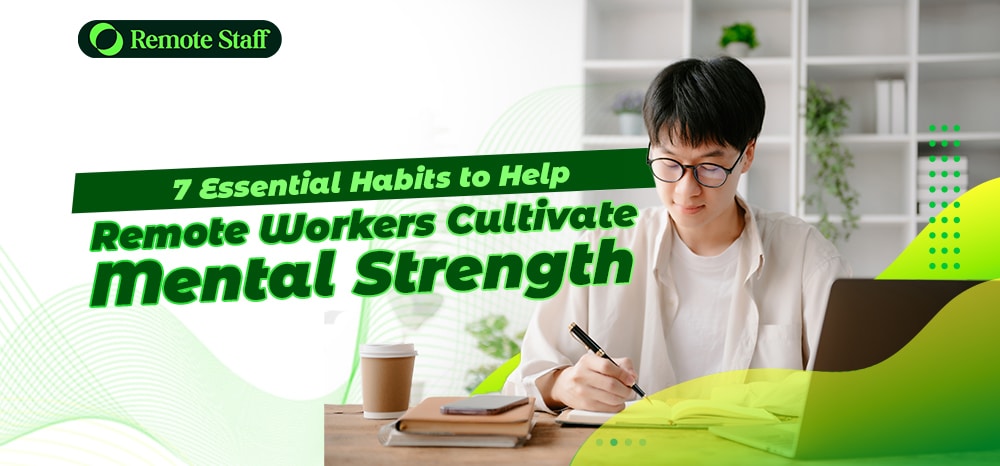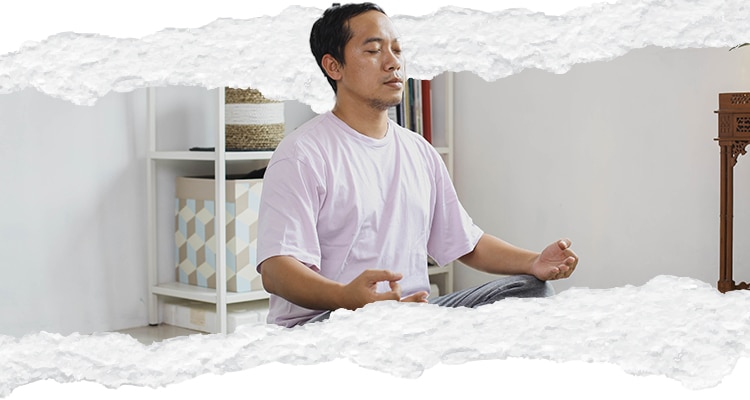Many Filipinos enjoy the perks of having an online job.
It offers location flexibility, allowing individuals to work from anywhere with an internet connection. Imagine, traveling the world whenever you want by becoming a digital nomad!
However, online workers face unique challenges like isolation, blurred boundaries between work and personal life, and a lack of structure.
Thus, it’s important to develop enough mental strength to tackle these challenges and thrive in online work.
What is Mental Strength?
Mental strength entails handling stress and adapting to life’s challenges effectively.
It requires resilience, determination, and a positive mindset to overcome obstacles and thrive in various situations.
Luckily, you can build mental strength by practicing a few habits. Here are 7 essential ones you can cultivate.
Organize Your Dedicated Workspace
First, you should set up a dedicated workspace.
You can designate a specific area for work, such as a separate room or a corner in your house, which establishes boundaries and reduces distractions.
However, it doesn’t stop there. Many remote workers don’t organize their workspace, leading to clutter that makes it hard to focus and be productive.
In fact, many studies have found that clutter can hinder mental clarity.
So keep your workspace clean and clutter-free to enhance focus, productivity, and overall mental well-being.
Take Scheduled Breaks
When you work remotely, you get a lot of free time, especially if you live in Manila. That’s an extra 2-3 hours per day saved from commuting alone.
You can use that extra time for passion projects or other financial ventures.
However, some remote workers are so focused on making extra money that they forget to rest.
Be sure to schedule breaks the same way you do for your tasks.
First, make sure to incorporate ample breaks into your work schedule. This can be a few minutes of rest or even a short 20-minute nap.
Next, allocate a few hours after each workday or even a full day per week to recharge.
Set Boundaries
Some remote workers feel tired because they struggle to separate their work from their personal lives, especially if they work and live in the same place.
Some bosses even call you after working hours since “you’re at home anyway.”
Left unchecked, this can lead to burnout and increased stress levels.
Therefore, setting boundaries is crucial to maintaining a healthy balance and protecting one’s well-being.
This means establishing specific work hours and honoring boundaries beyond work hours.
It can also mean saying “no” to additional work or commitments.
Don’t Neglect Exercise
Did you know that physical activity builds mental strength?
Aside from giving you better physical health, regular exercise has a positive impact on mood, stress levels, and overall cognitive function.
Regular physical activity also releases endorphins, which relieve anxiety and depression while boosting well-being.
You can go to the gym, play sports, or take walks in nature (which is scientifically proven to increase productivity).
Try a New Hobby
Contrary to popular belief, a hobby is not a waste of time. Hobbies can actually improve productivity.
Engaging in enjoyable activities outside of work reduces stress, improves mood, and promotes overall well-being.
Hobbies provide relaxation, stress relief, and personal fulfillment, possibly boosting confidence through developing other skills and interests outside work.
Nurture Social Relationships
Working remotely can lead to feelings of isolation, which can affect your mental well-being.
So it’s best to allot time to nurture your social relationships
These provide a sense of belonging, support, and connection, which are crucial for overall well-being.
Social interactions also provide opportunities for sharing experiences and receiving encouragement and advice, which can help you navigate challenges and build resilience.
Moreover, engaging with friends, family, and colleagues fosters positive emotions, reduces feelings of loneliness, and improves overall mood.
Try scheduling regular virtual coffee chats with colleagues, joining online communities based on your interests, or setting aside time each week to connect with friends or family.
If you can do it in person, that’s even better.
Practice Mindfulness
Lastly, practicing mindfulness to cultivate mental strength can help individuals develop a greater awareness of their thoughts and emotions in the present moment.
It enables individuals to respond more effectively to challenges and stressors instead of reacting impulsively.
Furthermore, it helps build resilience by helping you accept and come to terms with difficult emotions and situations instead of avoiding or suppressing them.
You can start with meditation and deep breathing exercises for around 5-10 minutes per day to cultivate mental strength, for instance
Done right, the habits above can boost your mental strength for remote work.
However, if you’re still looking for home-based jobs in the Philippines, you can sign up with Remote Staff for the best opportunities for Filipinos.
Remote Staff will match you with long-term clients who prioritize your mental well-being, as you focus on developing your career.
Register today!









